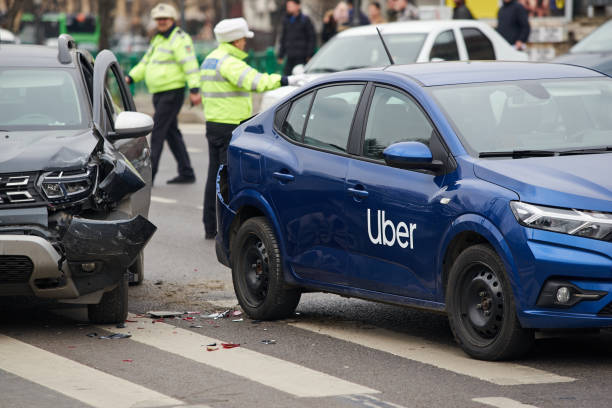Bethlehem Rideshare Accident Lawyer
Do you need a Bethlehem rideshare accident lawyer? If you or a loved one has been involved in an accident with an Uber, Lyft, or rideshare driver—whether as a passenger, another driver, or even a pedestrian—you have rights. Understanding these rights and navigating the complexities of rideshare accident claims requires the help of an experienced attorney. At Etemi Law, we are dedicated to helping victims of rideshare accidents receive the compensation they deserve.
Call us today at (203) 409-8424 for a


The Reality of Rideshare Accidents
Uber and Lyft have revolutionized transportation, providing millions of rides daily across the U.S. However, with the rise of these services, the number of rideshare-related accidents has also increased. Research from Rice University and the University of Chicago suggests that ridesharing services have contributed to a 2-3% increase in U.S. traffic fatalities since 2011, leading to up to 1,100 deaths annually.
Common Causes of Rideshare Accidents
Uber and Lyft drivers often operate under challenging conditions, increasing their risk of accidents. Some of the most common causes include:
- Distracted Driving – Relying on GPS, accepting ride requests, and managing passengers can divert a driver’s attention.
- Driver Fatigue – Many rideshare drivers work long hours or multiple jobs, leading to drowsy driving.
- Unfamiliar Routes – Navigating new areas can cause sudden stops or erratic driving behavior.
- Poor Vehicle Maintenance – Rideshare drivers are responsible for keeping their vehicles in good working condition, but lapses can lead to preventable accidents.
Connecticut Rideshare Laws and Regulations
Connecticut has strict laws governing rideshare companies and their drivers. These include:
- Mandatory Background Checks – Uber and Lyft must conduct background checks on all drivers, including a criminal record and driving history review.
- Vehicle Safety Requirements – Vehicles must pass inspections and meet specific safety criteria.
- Insurance Coverage – Rideshare companies must provide at least $1 million in liability coverage when drivers are transporting passengers.
- Driver Hour Limits – Uber and Lyft drivers can work a maximum of 14 consecutive hours and 16 hours in a 24-hour period to prevent fatigue-related accidents.
Who is Liable in a Rideshare Accident?
Determining liability in an Uber or Lyft accident can be complex, as multiple insurance policies may be involved. Our legal team at Etemi Law will investigate your case to establish liability and maximize your compensation.
If Another Driver is At Fault
- The at-fault driver’s insurance is the first line of compensation.
- If the at-fault driver is uninsured or underinsured, Uber/Lyft’s uninsured motorist coverage may apply.
If the Rideshare Driver is At Fault
- If the driver was logged into the app and waiting for a ride request, Uber/Lyft provides $50,000 per person/$100,000 per accident in bodily injury coverage.
- If the driver was transporting a passenger, Uber/Lyft provides $1 million in liability coverage.
- If the driver was off duty, their personal auto insurance applies.
Why You Need a Bethlehem Uber and Lyft Accident Lawyer
Rideshare accident cases involve multiple insurance companies and complicated liability issues. Insurance companies often try to minimize payouts, but with an experienced attorney from Etemi Law, you can fight for the full compensation you deserve.
Our legal team will: ✅ Investigate the accident thoroughly ✅ Obtain key evidence, including rideshare records and driver logs ✅ Negotiate aggressively with insurance companies ✅ Take your case to court if necessary
Contact Etemi Law Today
If you or a loved one has been injured in an Uber or Lyft accident, don’t wait. Protect your rights and get the compensation you deserve. Contact Etemi Law today for a free consultation.
📞 Call us at (203) 409-8424 💻 Visit us online to schedule your case review
In Bethlehem winters Route 61 becomes a study in treacherous microclimates — black ice between the village center and side streets, leaf-slick ruts under early snow. Rideshare drivers on narrow town lanes and their passengers both face sudden loss of control at low speeds, leading to rear-end strikes, door-impact knocks and low-speed T‑boning near Bethlehem Green. Those collisions often look minor but can spawn soft‑tissue injury and concussion.
On cold nights the Bethlehem Volunteer Fire Department becomes the frontline triage point when rideshare crashes clog side streets; volunteer crews stabilize fractures and suspected head injuries while coordinating slower ambulance rides to larger ERs. Because primary hospital care often requires transfer out of town, patients may be routed to Saint Mary’s Hospital (Waterbury) for imaging and admitted care, extending transport times and complicating early rehab starts.
Rideshare dynamics — app-based pickups at slushy curb cuts, sudden lane corrections when black ice shows itself, passengers stepping into raised thresholds — change the injury profile. Low-speed collisions yield sprains and whiplash, while slips getting out of a stopped vehicle can cause hip and wrist fractures that push people into weeks of outpatient physical therapy and, occasionally, interfacility transfer to rehabilitation centers in neighboring towns.
If you are injured while using a rideshare on a winter night, document the scene: timestamped app trip data, driver name and license plate, photos of black ice, curb conditions and vehicle damage. Early medical notes and imaging begin the loop of care that leads to physical therapy and possible mobility adjustments; tracking transfers and rehab milestones helps paint the clearest picture of the winter‑timed injury pathway.
